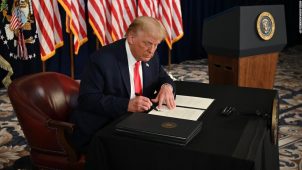The Revenge Of The Deporables theweek.com
t may have been politically ill-advised and numerically imprecise for Hillary Clinton to declare at a fundraiser in September 2016 that roughly half of Donald Trump's supporters belong in a "basket of deplorables" characterized by irredeemably "racist, sexist, homophobic, xenophobic, Islamophobic" views. But it was undeniably true.
This was obvious at the time, and it's even more so now, after the horrifying events of the past week — including the mailing of a dozen pipe bombs to prominent Democrats and the single deadliest attack on the Jewish community in American history.
Every president is elected by a distinct electoral coalition, and the coalition that elected Trump included an unusually large number of people with virulently illiberal, extreme right-wing views — the kind of people who normally find both major-party nominees far too blandly centrist to inspire much enthusiasm. Trump spoke to these voters. His championing of "birtherism," his denunciation of Mexican "rapists," his denigration and fear-mongering about Muslims, and his attacks on "globalist" bankers convinced these extremist voters that Trump shared their fears of the country becoming less white, less Christian, and less willing to defend its identity as a white, Christian nation against various invaders, including Muslims, immigrants from Latin America, blacks, and Jews.
ADVERTISEMENT
Along with his substantive message, Trump spoke to these voters with what one might call his habits of mind — his hostility to bedrock liberal norms and institutions (including a free press), his indulgence and encouragement of conspiracy theories, and his refusal to distance himself from far-right people and ideas.
The Trump administration in office has blended standard Republican policies (a big corporate tax cut; attempts to undermine the Affordable Care Act; bombing Syria in response to its use of chemical weapons) with various alt-right gestures (economic protectionism; the travel ban on people from select Muslim countries; family separation imposed on immigrants at the southern border). And then, of course, there are Trump's statements and tweets, which inevitably spew vituperation, sow division, and actively encourage fear of outsiders. The president might occasionally talk about the need for unity, but his nearly every substantive comment seems designed to encourage the already badly divided country to become even more sharply polarized.
It's also designed to activate right-wing extremists, by convincing them that their ideas and goals are no longer quite as anathema as they once were. Trump might disappoint the most rabid of them, but he's nonetheless managed to move the Overton Window in the direction favored by the deplorables. Jewish journalists were among the first to experience this during the 2016 presidential campaign, when anti-Semitic attacks online shot through the roof. The chilling events of the past week are the clearest sign yet of what life will be like in a country in which emboldened, heavily armed right-wing terrorists act to advance their aims.
It's important to recognize that facing this reality, and the president's role in bringing it about, doesn't require believing that Trump is personally an anti-Semite who harbors the kind of hatred for Jews that apparently inspired a homicidal maniac to kill 11 worshippers in a Pittsburgh synagogue on Saturday morning; or that he was personally cheered by news that a series of pipe bombs had been mailed to a lengthy list of his political enemies by a staunch supporter; or that he in any way approves of the white man who murdered two African Americans, apparently at random, in Kentucky last Wednesday. We can never know what's truly in another person's heart — and that's especially true when the person lies with the unrestrained abandon of our current president.
The question of Trump's "true views" is utterly irrelevant. What matters is what he says, and its effect on the country. And on that there can be little doubt. Trump spews his hateful poison into the civic culture of the country day in and day out. As political theorist Jacob T. Levy powerfully argued several months ago, we should not be surprised — indeed, we should expect — that it will have an effect.
One of those effects is to convince the deplorables that they now have greater room for maneuver — that things are moving in their direction, nudged along by the party that controls the White House and both houses of Congress. The evidence is everywhere — in Iowa's GOP Rep. Steve King becoming an open white supremacist while avoiding condemnation by senior members of his party; in explicit neo-Nazis running for office under the Republican banner; in the president praising a GOP congressman for assaulting a reporter; in the increasing use of George Soros (a Jewish philanthropist and donor to liberal causes) as an all-purpose target and scapegoat for events and policies the president and his white nationalist supporters detest. The list goes on and on.
As Republicans love to point out in response to those who blame the president's rhetoric for the escalation of demonization and seeming surge in incidents of deadly political violence, the unrest isn't originating entirely on the right. Antifa street thugs periodically cause trouble, Republican officeholders sometimes encounter angry protesters in public places, and in easily the worst example of all, a deranged Bernie Sanders supporter shot and severely injured Rep. Steve Scalise (R-La.) at a congressional baseball practice in June 2017.






Leave Your Comment